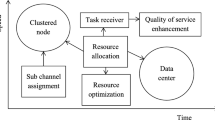Abstract
TDMA schedule is a complex problem with ad hoc. In order to minimize frame length, maximize channel utilization, reduce running time and increase fairness, a TDMA (M-TDMA) based on greedy selection and matrix OR is proposed. M-TDMA minimizes the frame length and maximizes the network throughput through greedy selection. It reduces the computing time by matrix OR, and increases fairness by random selection. The simulations show that the computing time and average delay of M-TDMA are significantly lower than that of TDMA schemes based on SVC. M-TDMA is also superior to TP-TDMA and N-TDMA in fairness.
Access this chapter
Tax calculation will be finalised at checkout
Purchases are for personal use only
Similar content being viewed by others
References
Ephremides, A., Truong, T.V.: Scheduling broadcast in multi-hop radio networks. IEEE Trans. Commun. 38(4), 456–460 (1990)
Aggeliki, S., Dimitrios, J.V., Dimitrios, D.V.: A survey of TDMA scheduling schemes in wireless multihop networks. ACM Comput. Surv. 47(3), 1–39 (2015)
Jaehyun Yeo, F., Heesoo Lee, S., Sehun Kim, T.: An efficient broadcast scheduling algorithm for TDMA ad-hoc networks. Comput. Oper. Res. 29(13), 1793–1806 (2002)
Clayton, W., Commander, F., Panos, M., Pardalos, S.: A combinatorial algorithm for the TDMA message scheduling problem. Computat. Optimizat. Appl. 43(3), 449–460 (2009)
Sinem, C.E., Pravin, V.: TDMA scheduling algorithms for wireless sensor networks. Wireless NetWork 16, 985–997 (2010)
Enrico Malaguti, F., Paolo Toth, S.: A survey on vertex coloring problems. Int. Trans. Oper. Res. 17(1), 1–34 (2009)
Komosko, L., Batsyn, M., Segundo, P.S., Pardalos, P.M.: A fast greedy sequential heuristic for the vertex colouring problem based on bitwise operations. J. Combinat. Optim. 31(4), 1665–1677 (2015). https://doi.org/10.1007/s10878-015-9862-1
Wang, G., Ansari, N.: Optimal broadcast scheduling in packet radio networks using mean field annealing. IEEE J. Select. Areas Commun. 15(2), 250–260(1997)
Wang Lingzhi, F., Chen Lingyu, S., Yuan Aisha, T.: N-time division multiple access dynamic slot allocation protocol based on I-sequential vertex coloring algorithm. Comput. Eng. 42(1), 89–94 (2016)
Zhang Xizheng, F., Wang Yaonan, S.: New mixed broadcast scheduling approach using neural networks and graph coloring in wireless sensor network. J. Syst. Eng. Electron. 20(1), 185–191 (2009)
Haixiang Shi, F., Lipo Wang, S.: Broadcast scheduling in wireless multihop networks using a neural network based hybrid algorithm. Neural Netw. 18(5), 765–771 (2005)
Shuai, X.: A greedy approach for TDMA based on matrix operation. In: Proceedings of CyberC, pp. 284–287 (2019)
Arivudainambi, D., Rekha, D.: An evolutionary algorithm for broadcast scheduling in wireless multihop networks. Wireless Netw. 18, 787–798 (2012)
Nobuo, F., Junji, K.: A gradual neural network algorithm for broadcast scheduling problems in packet radio networks. IEICE Trans Fundam. E82-A(5), 815–824(1999)
Jun, H., Hung, K.P..: Fairness of medium access control protocols for multi-hop ad hoc wireless networks. Comput. Netw. 48, 867–890 (2005)
Shi, H., Venkatesha Prasad, R., Onur, E. et al.: Fairness in wireless networks issues, measures and challenges. IEEE Commun. Surv. Tutorials 16(1), 5–24(2014)
Raj, J.: The Art of Computer Systems Performance Analysis: Techniques for Experimental Design, Measurement, Simulation, and Modeling. Wiley, Hoboken (1991)
Author information
Authors and Affiliations
Corresponding author
Editor information
Editors and Affiliations
Rights and permissions
Copyright information
© 2020 Springer Nature Switzerland AG
About this paper
Cite this paper
Xiaoying, S. (2020). A Fast TDMA Schedule Based on Greedy Approach. In: Habachi, O., Meghdadi, V., Sabir, E., Cances, JP. (eds) Ubiquitous Networking. UNet 2019. Lecture Notes in Computer Science(), vol 12293. Springer, Cham. https://doi.org/10.1007/978-3-030-58008-7_3
Download citation
DOI: https://doi.org/10.1007/978-3-030-58008-7_3
Published:
Publisher Name: Springer, Cham
Print ISBN: 978-3-030-58007-0
Online ISBN: 978-3-030-58008-7
eBook Packages: Computer ScienceComputer Science (R0)




